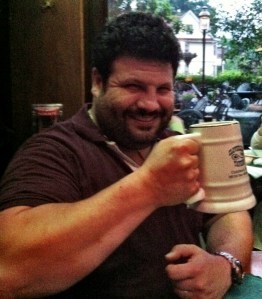Belly Up to the Bar with Gerald So
Gerald So is the editor of The 5-2: Crime Poetry Weekly, a founder of Font, Hofstra University’s literary magazine, and both the former president of the Short Mystery Fiction Society and editor at Thrilling Detective. His poetry has appeared in Babaric Yawp, Defenestration, and Yellow Mama, as well as in Protectors: Stories to Benefit PROTECT.
 TP: Welcome to Belly Up to the Bar, Gerald. What can I get you?
TP: Welcome to Belly Up to the Bar, Gerald. What can I get you?
 TP: I bet Crime Poetry still raises some eyebrows, even though you’ve been doing this a while. Which is odd, because writers like Ken Bruen are often given the title “noir poet” as a compliment. Tell us a bit about why poetry is so well suited for writing about crime.
TP: I bet Crime Poetry still raises some eyebrows, even though you’ve been doing this a while. Which is odd, because writers like Ken Bruen are often given the title “noir poet” as a compliment. Tell us a bit about why poetry is so well suited for writing about crime.
 GS: Because it is concise by nature, poetry has a sense of urgency much like crime fiction. Every word, every line elicits a reaction driving toward a larger goal. Much poetry can be read as originating from slights, wrongs, or more serious harm poets have experienced. Poetry encourages us to focus emotion as tightly and powerfully as we can.
GS: Because it is concise by nature, poetry has a sense of urgency much like crime fiction. Every word, every line elicits a reaction driving toward a larger goal. Much poetry can be read as originating from slights, wrongs, or more serious harm poets have experienced. Poetry encourages us to focus emotion as tightly and powerfully as we can.
 TP: Poetry in general is more distilled. I think it was Faulkner, but I’ve heard it attributed to both Joyce and Hemingway, who both wrote poetry, that every novelist is a failed poet. My friend Drew Fader, who is also in Protectors, has told me of days where he’s struggled over a single word. Is poetry that much of a struggle for you?
TP: Poetry in general is more distilled. I think it was Faulkner, but I’ve heard it attributed to both Joyce and Hemingway, who both wrote poetry, that every novelist is a failed poet. My friend Drew Fader, who is also in Protectors, has told me of days where he’s struggled over a single word. Is poetry that much of a struggle for you?
 GS: I struggle to gain perspective on my emotions and experiences, but that ultimately helps me as a person. To me, raw emotion on a page is too volatile to be a poem. The goal of any writing for publication is to reach an audience, and that requires refining one’s message to its most effective.
GS: I struggle to gain perspective on my emotions and experiences, but that ultimately helps me as a person. To me, raw emotion on a page is too volatile to be a poem. The goal of any writing for publication is to reach an audience, and that requires refining one’s message to its most effective.
 TP: You taught at Hofstra, but now you write full time. How did it feel to take that plunge? I know fiction writers who’ve done it, and one tech writer and editor, but you’re the first poet. Do you write fiction or nonfiction as well, to pay the bills?
TP: You taught at Hofstra, but now you write full time. How did it feel to take that plunge? I know fiction writers who’ve done it, and one tech writer and editor, but you’re the first poet. Do you write fiction or nonfiction as well, to pay the bills?
 GS: My last teaching position was downsized, so I was sort of forced into writing full time, but it also felt like the natural next step. I also write fiction and reviews of books, TV, and film, and I create poetry ebooks because so few seem to make the effort to preserve poetic lines.
GS: My last teaching position was downsized, so I was sort of forced into writing full time, but it also felt like the natural next step. I also write fiction and reviews of books, TV, and film, and I create poetry ebooks because so few seem to make the effort to preserve poetic lines.
 TP: I think poetry gets short shrift these days. Everyone knew Frost, just as Hemingway was popular in his time, but today it’s the genre writers that everyone knows. Stephen King, Harlan Coben, John Grisham. Do you think genre poetry could push the pendulum in the other direction?
TP: I think poetry gets short shrift these days. Everyone knew Frost, just as Hemingway was popular in his time, but today it’s the genre writers that everyone knows. Stephen King, Harlan Coben, John Grisham. Do you think genre poetry could push the pendulum in the other direction?
 GS: That would be nice. I honestly gave no thought to gaining attention when I began seriously writing poetry. It seemed to be the best form for some of my ideas, and now I can’t give up poetry in favor of fiction or any other kind of writing. It deserves my best, and as long as I’m here, I may as well try to advance its cause.
GS: That would be nice. I honestly gave no thought to gaining attention when I began seriously writing poetry. It seemed to be the best form for some of my ideas, and now I can’t give up poetry in favor of fiction or any other kind of writing. It deserves my best, and as long as I’m here, I may as well try to advance its cause.
 TP: You headed the Short Mystery Fiction Society, who give out the Derringer Awards. I prefer short stories for punch, and wish there were more wide-reaching venues for them. What are some of the best short crime fiction stories you’ve read, online or otherwise?
TP: You headed the Short Mystery Fiction Society, who give out the Derringer Awards. I prefer short stories for punch, and wish there were more wide-reaching venues for them. What are some of the best short crime fiction stories you’ve read, online or otherwise?
 GS: All-time favorites include Bill Pronzini’s Nameless Detective stories and Rob Kantner’s Ben Perkins. I like how Kantner weaves backstory between each Perkins story. I get the sense of a man living a full life. From my time editing Thrilling Detective, I enjoyed stories by Ray Banks, Russel McLean, Stephen D. Rogers, Sarah Weinman, Dave White, and Jim Winter.
GS: All-time favorites include Bill Pronzini’s Nameless Detective stories and Rob Kantner’s Ben Perkins. I like how Kantner weaves backstory between each Perkins story. I get the sense of a man living a full life. From my time editing Thrilling Detective, I enjoyed stories by Ray Banks, Russel McLean, Stephen D. Rogers, Sarah Weinman, Dave White, and Jim Winter.
 TP: I read a lot of Nameless, Pronzini was always a great read. I wrote some poetry in college. Mostly free verse, stream of consciousness stuff that for me, worked better as prose. But I enjoy a lot of poetry, from the Iliad to what Amiri Baraka calls “low ku,” a play on haiku. What modern poets should we be reading? In addition to the ones you publish in the 5-2, of course.
TP: I read a lot of Nameless, Pronzini was always a great read. I wrote some poetry in college. Mostly free verse, stream of consciousness stuff that for me, worked better as prose. But I enjoy a lot of poetry, from the Iliad to what Amiri Baraka calls “low ku,” a play on haiku. What modern poets should we be reading? In addition to the ones you publish in the 5-2, of course.
 GS: Of the top of my head: Sharon Olds, Kim Addonizio, Donald Justice, Edward Hirsch, Ada Limon, Sandra Beasley…
GS: Of the top of my head: Sharon Olds, Kim Addonizio, Donald Justice, Edward Hirsch, Ada Limon, Sandra Beasley…
 TP: I look forward to checking them out. Do you think comparing music and poetry is valid? Obviously they are not always the same, but can be. I think the music always wins over the lyrics. Example, “Born in the USA” being used patriotically, when it’s about a Vietnam vet getting treated like garbage by his country. Are there any musicians you’d honestly call poets?
TP: I look forward to checking them out. Do you think comparing music and poetry is valid? Obviously they are not always the same, but can be. I think the music always wins over the lyrics. Example, “Born in the USA” being used patriotically, when it’s about a Vietnam vet getting treated like garbage by his country. Are there any musicians you’d honestly call poets?
 GS: I do think it’s valid. The best poetry has musicality behind its words and structure. I’m not up on current music, but two names that come to mind are Don McLean and Jackson Browne.
GS: I do think it’s valid. The best poetry has musicality behind its words and structure. I’m not up on current music, but two names that come to mind are Don McLean and Jackson Browne.
 TP: It’s last call, my friend. What would be your last meal?
TP: It’s last call, my friend. What would be your last meal?
 GS: I’d go to an all-you-can-eat buffet. Is that cheating? Okay. I’d have a steak, baked potato, and root beer.
GS: I’d go to an all-you-can-eat buffet. Is that cheating? Okay. I’d have a steak, baked potato, and root beer.
 TP: Thank you for dropping by, Gerald. You opened my eyes to what poetry can do, and I hope this interview does the same for everyone reading it.
TP: Thank you for dropping by, Gerald. You opened my eyes to what poetry can do, and I hope this interview does the same for everyone reading it.
Tagged: Gerald So, Poetry



Thomas Pluck's Blog
- Thomas Pluck's profile
- 122 followers




